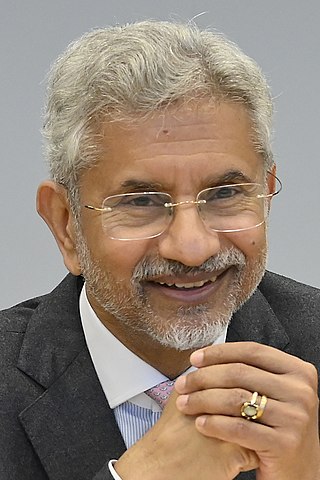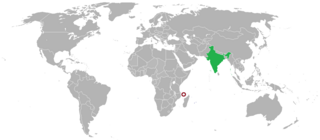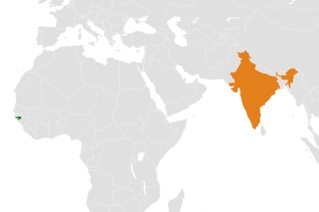
Bangladesh–India relations are the bilateral relations between the People's Republic of Bangladesh and the Republic of India, both of which are South Asian neighbours. Diplomatic relations between the two countries formally began in 1971 with India's recognition of an independent Bangladesh following India helping Bangladesh secure its independence during the Bangladesh Liberation War against Pakistan. On 6 December, Bangladesh and India celebrate Friendship Day commemorating India's recognition of Bangladesh and the continued friendship between the two countries.

Sushma Swaraj was an Indian lawyer and politician, who served as the Minister of External Affairs of India in the first Narendra Modi government from 2014 to 2019. She was the second person to complete a 5-year term as the Minister of External Affairs, after Jawaharlal Nehru. A senior leader of the Bharatiya Janata Party (BJP), Swaraj was the second woman to hold the office of Minister of External Affairs, after Indira Gandhi. She was elected seven times as a Member of Parliament and three times as a Member of the Legislative Assembly. At the age of 25 in 1977, she became the youngest cabinet minister of the Indian state of Haryana. She also served as 5th Chief Minister of Delhi for a short duration in 1998 and became the first female Chief Minister of Delhi.

Since the 1990s, the Republic of India and the State of Israel have had a comprehensive economic, military, and political relationship. In 1947, India voted against the United Nations Partition Plan for Palestine, but nonetheless recognized Israeli sovereignty in 1950. Israel opened a consulate in Bombay in 1953. Collaboration gradually increased as Israel became a key Indian ally amidst the India–Pakistan conflict; Israel supplied India with armaments, ammunition, and intelligence during the Indo-Pakistani War of 1971 and the Indo-Pakistani War of 1999. Full diplomatic relations were established in 1992, when India opened an embassy in Tel Aviv and Israel opened an embassy in New Delhi. Both countries are members of the I2U2 Group, formed in October 2021, and have stated that they have a strong bilateral relationship, sharing similarities in spirit and facing common challenges, increasingly cooperating in the industrial and technological sectors.

The bilateral relations between the Himalayan Kingdom of Bhutan and the Republic of India have been traditionally close and both countries share a "special relationship", making Bhutan a protected state, but not a protectorate, of India. India remains influential over Bhutan's foreign policy, defence and commerce. Bhutan is the largest beneficiary of India's foreign aid.

The Act East policy is an effort by the government of India to cultivate extensive economic and strategic relations with the nations of Southeast Asia to bolster its standing as a regional power and a counterweight to the strategic influence of the People's Republic of China. Initiated in 1991, the Look East policy by Indian government marked a strategic shift in India’s perspective of the world. It was developed and enacted during the government of Prime Minister Narsimha Rao (1991–1996) and rigorously pursued by the successive administrations of Atal Bihari Vajpayee (1998–2004) and Manmohan Singh (2004–2014).
India–Mongolia relations, also known as Indian-Mongolian relations or Indo-Mongolian relations, are bilateral relations between the democratic republics of India and Mongolia. These relations are rapidly developing, with Indo-Mongolian cooperation formerly limited to diplomatic visits, provision of soft loans and financial aid and the collaborations in the IT sector; but were enhanced in 2015 by Narendra Modi's visit to Ulaanbaatar, where the two Prime Ministers declared a "strategic partnership" between the two Asian democracies.

India-Holy See relations are the bilateral relations between the India and Holy See, which is sovereign over the Vatican City. Formal bilateral relations between the two exist since 12 June 1948. An Apostolic Delegation existed from 1881. The Holy See has a nunciature in New Delhi while India has accredited its embassy in Vienna, Austria to the Holy See as well. India's Ambassador in Bern has traditionally been accredited to the Holy See. Since 2020, Jaideep Mazumdar, India's ambassador to Austria has been the ambassador to the Holy See. Archbishop Leopoldo Girelli was appointed as the Apostolic Nuncio to India in March 2021.

India–Kyrgyzstan relations are the relations between India and Kyrgyzstan.

India–United Arab Emirates relations are the bilateral relations that exist between the Republic of India and the United Arab Emirates. Since 3000 B.C., India and the UAE, including its precursor emirates, had close relations with ancient trade networks. Sumerians traded with Meluhha, Magan, and Dilmun (Bahrain), connecting through the UAE. Maritime routes facilitated Arab trade with India for silk, spices, gold, and porcelain. Sumerians traded with Meluhha, Magan, and Dilmun (Bahrain), connecting through the UAE. Maritime routes facilitated Arab trade with India for silk, spices, gold, and porcelain. Post-1971, India-UAE relations strengthened politically, economically, and culturally.

Subrahmanyam Jaishankar is an Indian diplomat and politician serving as the Minister of External Affairs of the Government of India since 30 May 2019. He is a member of the Bharatiya Janata Party and a Member of Parliament in the Rajya Sabha since 5 July 2019. He previously served as the Foreign Secretary from January 2015 to January 2018. He became the second ever diplomat to be appointed as India's External Affairs minister, after Natwar Singh.
The foreign policy of the Modi government is associated with the policy initiatives made towards other states by the current government of India after Narendra Modi assumed the office of prime minister on May 26, 2014.

Sushma Swaraj was the Indian External Affairs Minister under Prime Minister Narendra Modi from May 2014 till May 2019, responsible for implementing the foreign policy of Narendra Modi. She is only the second women to hold this position after Indira Gandhi.

The most significant initiative made by the Narendra Modi government is the focus on neighbouring countries and major Asian powers coupled with emphasizing on the two decades old Look East policy. Asia being the major focus area of his foreign policy, Modi and his foreign minister chose several Asian countries for their initial bilateral visits. He has made state visits to Bhutan and Nepal and Japan within the first 100 days of his government and also hosted Asian leaders like former Prime Minister Tony Abbott of Australia, President Xi Jinping of China and Prime Minister Nguyễn Tấn Dũng of Vietnam, apart from inviting SAARC leaders in his inauguration ceremony. External Affairs Minister Sushma Swaraj has also made official visits to several Asian capitals like Dhaka, Bangladesh, Kathmandu, Nepal, Naypidaw, Myanmar, Singapore, Hanoi, Vietnam, Manama, Bahrain, Kabul, Afghanistan, Dushanbe, Tajikistan, Malé, Maldives, Abu Dhabi, United Arab Emirates, Seoul, South Korea and Beijing China.

Neighbourhood First Policy of India, a core component of India's foreign policy, focuses on peaceful relations and collaborative synergetic co-development with its South Asian neighbours of the Indian subcontinent encompassing a diverse range of topics, such as economics, technology, research, education, connectivity, space program, defence security, environment and climate challenge. This policy creates new avenues as well as leverages to the existing regional cooperation initiatives such as SAARC, SASEC, BBIN, and BIMSTEC. It compliments India's Look East policy focused on Southeast Asia and Look West Policy focused on Middle East.

India–Qatar relations refers to the bilateral ties between India and Qatar. India maintains an embassy in Doha, while Qatar maintains an embassy in New Delhi and a consulate in Mumbai.

Comoros–India relations are the international relations that exist between Comoros and India. The Embassy of India in Antananarivo, Madagascar is concurrently accredited to Comoros. India also maintains an Honorary Consulate General in Moroni. Comoros maintains an Honorary Consulate in New Delhi.

Guinea-Bissau–India relations refers to the international relations that exist between Guinea-Bissau and India. The embassy of India in Dakar, Senegal is concurrently accredited to Guinea-Bissau. India opened an Honorary Consulate in Bissau on 28 May 2010. Guinea-Bissau has no diplomatic mission in India.

India–Solomon Islands relations are the international relations between India and Solomon Islands. Neither country has a resident ambassador. The High Commission of India in Port Moresby, Papua New Guinea is concurrently accredited to the Solomon Islands

The 2+2 Ministerial Dialogue is a diplomatic summit that has been held every year since 2018 initially between the Minister of External Affairs or Foreign Minister, and Defence Minister of India with the Secretary of State and Secretary of Defense of the United States to discuss and work on common issues of concern to improve and strengthen India–United States relations.



















